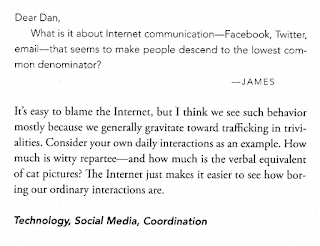Talk about making life's lemons into lemonade! Dan Ariely suffered catastrophic burns, spent three years in a hospital, and basically missed out entirely on being a teenager. Would he have studied social science without having had those experiences? There is no way to know, but he has become an adept observer of the human condition. Even more, he is an expert on irrationality and is a professor of Psychology and Behavioral Economics at Duke University.
For all that humans are called "the rational animal", and though this rationality has led to high civilization and amazing technology, there is little evidence that humans in general lead rational lives. Quite the contrary: we spend most of our time on autopilot, repeating the habits we learned when very young.
Young children are learning machines. What a pity that the need to regiment our "education" is almost exactly designed to minimize true learning! Fortunately, there is time "after school" and "after homework". As my youngest brother told us at my parents' Fiftieth Anniversary party, growing up with three older brothers, "I got lots of education when I wasn't being schooled." But by age twelve or so, the inner compulsion to learn wanes, and pretty much ends by age twenty, for most of us.
Here is how I define neurosis: Neurosis is a defense mechanism that is seriously out of date. PTSD is an extreme version. Less extreme, but still troubling, is our tendency to react to the words and actions of others as though they came from people we hated or feared years and decades ago. I once lost a girlfriend because I keep a record of my gasoline purchases in my glove compartment. Her ex-husband also did that, and she couldn't abide the feelings that arose when she saw me write down the mileage and what I'd spent for gas.
People who were bit by a dog at a very early age may fear all dogs for the rest of their life. Woe to such a person who marries a dog lover! A woman we know grew up with a psychotic mother who would be walking across the room, and suddenly reach over and hit her from behind. Our friend is a skilled pianist, but cannot play a piano that faces the wall. She needs a wall at her back when playing, even though nobody has tried to hit her from behind for forty years!
We live with and continually exhibit milder irrationalities day to day, and when we notice them, we may be motivated to develop a new habit. Or maybe not. Some folks who read the Wall Street Journal send questions about such things to the Ask Ariely column, and the lucky ones get answered. The most recent questions answered (in Dan's unique way) include "Where should we seat those awful wedding guests?" and "Is 'First come, first served' really fair?".
Dan's column and other research have provided fodder for three previous books, and now this one, Irrationally Your: On Missing Socks, Pickup Lines, and Other Existential Puzzles. Many of the items include more-or-less-relevant cartoons by William Haefeli:


This shows such a pairing, and I used an image of the page's text, mainly to avoid all the formatting and finding the right typefaces to roughly imitate it. This also shows a feature I haven't seen elsewhere (except in my own blog posts): keywords or index tags!
This isn't "Ask Abby" kind of advice, and I suspect the questions are ones Abby would not have deigned to answer. I picked a short answer above; most are about twice as long and some run a couple of pages.
Do you want to know why pickup lines, cheesy as they are, work at all? Boiling down two paragraphs of Dan's answer: People like to be complimented. Based on that, Dan says, "Compliments are free … why not just give more of them." Good advice to us all. Asked about the apparent multiplication of mismatched socks, Dan discusses our perceptions, and recommends going to the trouble of sorting all the socks; some of the "mismatched" ones will probably have matches that were "mismatched" earlier and are probably only inches from their mate. But he also ponders the chance that dryers might have "sock black holes."
Some of the correspondents have creative ideas of their own to share, such as the guy who glued quarters to his office stapler and a few other frequently-"borrowed" items. None went missing after that. Another asks whether setting a higher or somewhat low price for a house to be sold will yield the best final price; he guesses that a lower starting price might work better. Dan agrees, pointing out that if you have only one potential buyer, you are at a negotiating disadvantage, and may wind up accepting a low-ball offer; with several people competing, attracted by the lower initial price, you are more likely to get a better offer from at least one of them.
The overall message is, if we more clearly realize that the irrationality of "rational animal", that is, why people really do what they do, we're more likely to relate to others in a more satisfactory way, and more likely to get what we want out of life. I dimly realized some of these things long ago, leading to the first "commandment" of ten that I hung on my office wall: People don't want to be treated fairly. They want to be treated well. The work of Dan Ariely, Nobelist Daniel Kahneman and others can help us treat others well without treating ourselves badly.



No comments:
Post a Comment